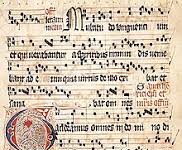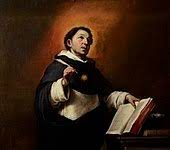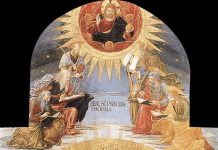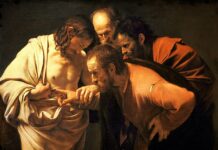August 11th is the traditional feast of Saint Clare of Assisi, and what comes into my mind and heart is her Testament between the years 1247 and 1253. Clare’s Testament is important because it clearly reveals her heart as well as her love for the life given to her by God’s grace through Saint Francis.
Clare starts her Testament by attributing to what she was about to share in the name of the Lord. This biblical phrase is pivotal to what Clare experienced in her following of Jesus in the footsteps of Saint Francis. From the outset Clare is imbued with infinite gratitude to God for the merciful love he has shown to her in her new life in Christ. She confesses:
Among the other gifts that we have received and do daily receive from our benefactor, the Father of Mercies, and for which we must express the deepest thanks to the glorious Father of Christ, there is our vocation, for which, all the more by way of its being more perfect and greater, do we owe the greatest thanks to him.
Then, Clare openly acknowledges that she needed a role model to love God. The first role model was undoubtedly Jesus followed by Saint Francis. She states: Therefore the Apostle writes: “Know your vocation”. The Son of God has been made for us the Way, which our Blessed Father Francis, his true lover and imitator, has shown and taught us by word and example.
It is interesting that in her Testament, Clare goes back to her gratitude to God, which moves her to encourage her sisters to show themselves gratitude to God for the vocation he has given them thanks to his merciful love as his beloved servant, … blessed father Francis. She says: Therefore, beloved sisters, we must consider the immense gifts that God has bestowed on us, especially those that he has seen fit to work in us through his beloved servant, our blessed father Francis, not only after our conversion but also while we were still living among the vanities of the world.
Clare treasured in her heart Francis’ vocation of rebuilding Jesus’ Church. She sees her life together with that of her sisters as a prophecy foretold by the Poverello himself. She said: In fact, almost immediately after his conversion, when he had neither brothers nor companions, while he was building the church of San Damiano, where he was totally visited by divine consolation and impelled to completely abandon the world , through the great joy and enlightenment of the Holy Spirit, the holy man made a prophecy about us that the Lord later fulfilled. For at that time , climbing the wall of that church, he shouted in French to some poor people who were standing nearby: “Come and help me in the work of building the monastery of San Damiano, because ladies are yet to dwell here who will glorify our heavenly Father throughout his holy, universal Church by their celebrated and holy manner of life.”
For Clare this prophecy was the result of God’s mercy and love not only for them but also for the Poor Clares who would join them in the future. Because of this abundant kindness of God Clare feels that she and her sisters are to persevere so as to be like that sound tree [which] bears good fruit (Matt 7:17) of which Jesus rightly speaks about in the Saint Matthew’s Gospel. Clare states: With what eagerness and fervour of mind and body, therefore, must we keep the commandments of our God and Father, so that, with the help of the Lord, we may return to him an increase of his talent! For the Lord himself has placed us not only as a form for others in being an example and mirror, but even for our sisters whom the Lord has called to our way of life as well, that they in turn might be a mirror and example to those living in the world.
Obviously, in the latter periscope of the Testament Clare is wisely referring to what Jesus tells us in the Gospel of Matthew when he says: You are the light of the world. A city set on a hill cannot be hid. Nor do men light a lamp and put it under a bushel, but on a stand, and it gives light to all in the house. Let your light so shine before men, that they may see your good works and give glory to your Father who is in heaven (Matt 5:14-16).
Hence, for Clare, mirroring Jesus to others is her and her sisters’ contribution and a special way of rebuilding the Church. She writes: Since the Lord has called us to such great things that those who are to be a mirror and example to others may be reflected in us, we are greatly bound to bless and praise God and be all the more strengthened to do good in the Lord. Therefore, if we live according to the form mentioned above, we shall leave others a noble example and gain, with very little effort, the prize of eternal happiness.
Another very important value which Saint Clare teaches in her Testament is that true evangelization is done when there is communion between Christ’s disciples. In her own simple yet profound way, Clare says that hers and her sisters’ way of life is connected with and supported by Saint Francis and his brothers. She highlights this important point with the subsequent words: After the most high heavenly Father saw fit in his mercy and grace to enlighten my heart, that I should do penance according to the example and teaching of our most blessed father Francis, a short while after his conversion, willingly promised him obedience, as the Lord gave us the light of his grace through his wonderful life and teaching. When the blessed Francis saw, however, that, although we were physically weak and frail, we did not shirk deprivation, poverty, hard work, trial, or the shame or contempt of the world – rather , we considered them as great delights, as he had frequently examined us according to the example of the saints and his brothers – he greatly rejoiced in the Lord. And moved by compassion for us, he bound himself, both through himself and through his Order, to always have the same loving care and special solicitude for us as for his own brothers.
Finally, Clare is also stating that being a Poor Clare sister means participating in that continual rebuilding of Christ’s Church throughout the centuries. It is from there, the Church of Saint Damiano, that they grew in number because that was the sign of Francis’ rebuilding Christ’s Church. She says: And thus, by the will of God and our most blessed father Francis, we went to dwell in the Church of San Damiano, where, in a little while, the Lord, through his mercy and grace, made our numbers increase so that he would fulfill what he had foretold through his saint, In fact, we had stayed in another place before this, but only for a short while.
From these brief reflections about her Testament we can easily conclude that Saint Clare was absolutely right when she referred to herself as the little plant (pianticella) of Saint Francis.











